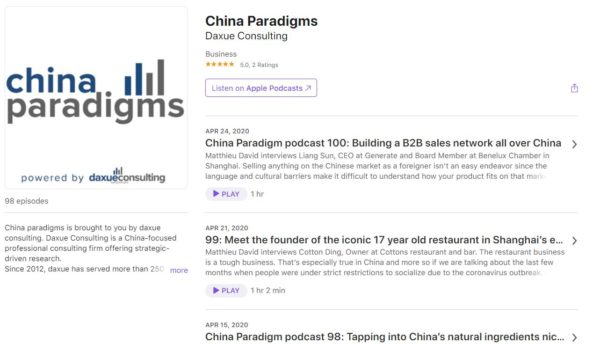Under the Chinese context, the word “Second-hand” (二手货) does not have a positive perception, as the previous generation of consumers do not take pride in consuming used product. It is a stereotype from the last consumer era in China when people were looking for “brand-new”, “luxury” and “possessions”.
However, as the economy has matured, growth has slow down and environmental awareness is on the rise, Chinese consumer expectations have also changed – instead of blind consumerism, the rational consumption concept has become mainstream. This boosted the market for second-hand e-commerce in China.
Furthermore, due to the rapid development of the Internet in China, consumption patterns also face a dramatic change, from traditional retail to integrated e-commerce, from integrated e-commerce to vertical e-commerce, O2O e-commerce, and social e-commerce. “Second-hand” is no longer a pejorative term, but an option for Chinese customers in daily shopping.
The Chinese second-hand market is growing
Since Chinese second-hand e-commerce platforms began to draw attention in 2011, this market has been growing at a rapid pace. According to the China Center for Internet Economy Research, the second-hand transactions in China are expected to exceed 1 trillion yuan (143 billion USD) at the end of 2020.
Additionally, iiMedia Research showed the online second-hand platforms’ users reached 76 million in 2017, with a growth rate of 55.1%. As of 2020, users of the Chinese second-hand e-commerce platforms exceeded 100 million.
On the Chinese second-hand e-commerce platform, Idle Fish (Xianyu, 闲鱼), the biggest Chinese C2C second-hand platform and community, its daily active users (DAU) has reached 20 million, and the total number of active individual products was 60 million, as of 2019.
As product cycles become shorter, it is believed that second-hand e-commerce in China will gradually increase in the future.
Main players in second-hand e-commerce in China
Alibaba’s Idle Fish and Tencent-backed Zhuanzhuan (转转) have entered second-hand e-commerce in China many years ago. However, in recent years, faced with such a potential market, more and more vertical second-hand platforms have appeared as well.
Idle Fish
Idle Fish was launched as a second-hand channel on Taobao in 2012, and spun off as an independent mobile app two years later. By the end of 2019, Idle Fish had achieved more than 100 billion RMB in annual revenue.
Even though Idle Fish is a standalone app, it takes many advantages from Taobao. Second-hand items directly show on Taobao’s search results. Also, on the Taobao buyer’s order information page, the “one-click resale” directly jumps to Idle Fish. From new products to second-hand resale, the connection between Taobao and Idle Fish is very natural for users.
Through Idle Fish, consumers can find a variety of second-hand, recycled, refurbished, and for-rent goods. Idle Fish calls itself not only a second-hand e-commerce platform but also a C2C community. Idle Fish’s online communities, Fish Ponds, are based on interest, location, institutions and other categories, which are similar to offline second-hand scenarios. It allows users to sell, buy, and exchange unwanted products. According to the founder of Idle Fish, Chen Weiye, the transaction conversion rate for users in a Fish Pond is 13.5%, while the conversion rate for users who not in a Fish Pond is only 0.07%.
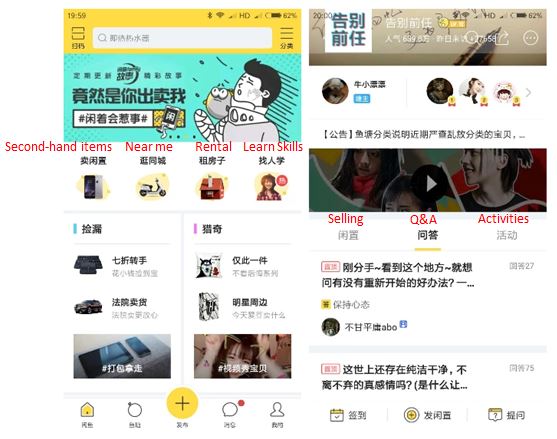
Source: uzshare.com, Idle Fish main page and a Fish Pond page
Gen Z and millennials are the main users of Chinese second-hand e-commerce platforms like Idle Fish
According to a report from Idle Fish, 52% of its users were Gen Z and millennials in 2018. They are the most active in online communities, with 20% more than other users. Every Gen Z and millennial user joins four fish ponds on average where they are able to find their own community of interest, interact with each other, and have access to find limited or unique editions, to satisfy their hobby. Second-hand cameras, anime models, and traditional costumes, are the most popular communities on Idle Fish. Users are gathering because of hobbies.
In the fish ponds, Gen Z and millennials also focus on content relevant to their own life. For instance, a Fish Pond called “say goodbye to my ex”, where users sell gifts from their ex-boyfriends or girlfriends, has nearly 80,000 users.
Apart from second-hand items trading, more forms have also been derived from Idle Fish to meet people’s diversified demands, including house leasing, product leasing, and trade-in services.
Zhuanzhuan
Like Idle Fish, Zhuanzhuan also comes from an upgrade of second-hand channels on 58.com. After an investment of $200 million from Tencent, it got support from the WeChat platform.
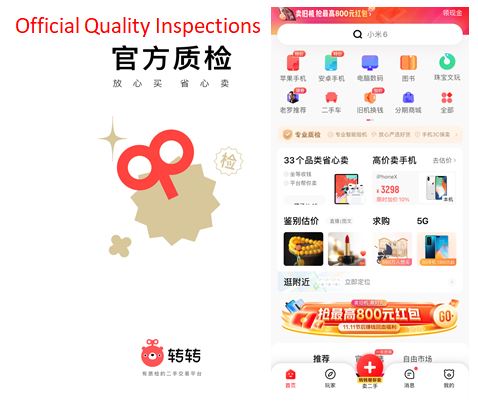
Source: Zhuanzhuan App, Zhuanzhuan’s opening page and main page
Although Zhuanzhuan is an integrated Chinese second-hand e-commerce platform, it works as a C2B2C model – a combination of C2C and B2C. For the high priced products, like smartphones and laptops, Zhuanzhuan set a quality standard with Foxconn, through the provision of quality inspections and transaction guarantee services to ensure the quality on the platform. As for the low priced products, like clothing and books, users can choose to an individual or to the platform.
The C2B2C model meets the different needs of sellers and buyers. The second-hand products collected by Zhuanzhuan will be under standardized management, including recycling, cleaning, disinfection, and a series of renewals. Buyers also benefit from having the opportunity to buy gently used goods for half the normal price.
Used car e-commerce platforms
Getting rid of the competition between Alibaba and Tencent, the vertical e-commerce platforms have found their living space in the second-hand e-commerce market in China.
The booming of car ownership in China brings abundant room for growth in the used car market. In 2018, used car sales grew by 11.5% to 13.8 million, despite a slight decline of 2.8% in the Chinese auto market. Of these used cars, 3.2 million were sold online.
“Compared with traditional brick-and-mortar stores, online stores have a higher trading efficiency,” said Xu Guoyun, the former vice-president of a leading online vehicle transaction platform.
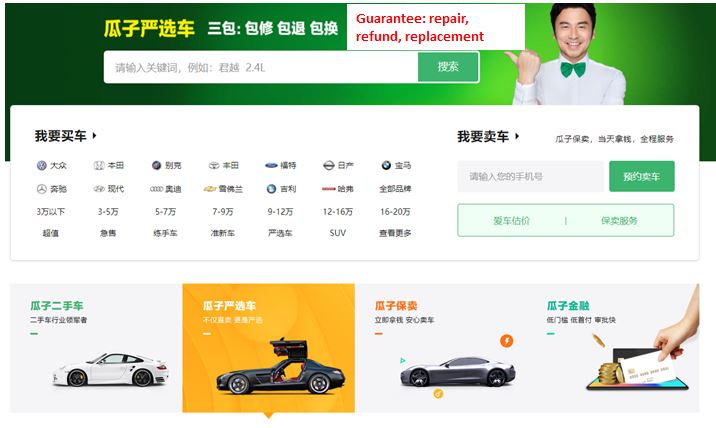
Source: Guazi used car, Guazi website main page
Online used car e-commerce platform, Guazi, provides consumer to consumer services, as its advertisements saying “No dealers enjoy the price difference”. Generally, the service fee of a traditional offline used-car dealer is more than 30%, whereas this number is only about 13% on Guazi. Such a discount attracts more and more people to sell and buy used cars online.
Fraud is a major concern in the Chinese second-hand e-commerce platforms
The top reason for consumers to not use Chinese second-hand e-commerce platforms is “ fraud and fake products”. Most of them may view the second-hand products online, but take a wait-and-see attitude because of the lack of trust in goods and platforms. In August 2020, Idle Fish’s Fish Ponds was temporarily closed due to illegal and misleading information.
Idle Fish benefits from the Alibaba ecosystem, including Alipay online payment service and Zhima credit scoring and loyalty program system. Alipay guarantees the safety of the transaction, and Zhima Credit Score can prevent potential fraud by analyzing individual credit behavior through the Ali system. A lower score usually means the person needs to provide additional information or pay a deposit to make a deal on Idle Fish.
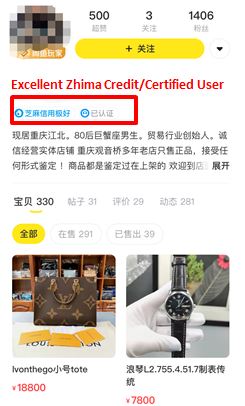
Source: Idle Fish App, user profile shows Zhima Credit Score
Zhuanzhuan, on the other hand, is based on the WeChat ecosystem and quality inspection standards, which enhances the trust between users and reduce false advertising. The same with used car e-commerce platforms, they are increasingly investing in offline retail stores and establishing a product standardization system in order to give customers confidence in purchasing used cars.
Second-hand luxury market in China is on the rise
An important part of second-hand e-commerce is the second-hand luxury market in China is also beginning to grow. On Idle Fish, the luxury communities are often led by KOLs and celebrities. More than 100 celebrities have sold used luxury bags and clothes on the platform. An original 20,000 yuan Gucci sweatshirt could be sold for 5,000 yuan on celebrities’ Idle Fish store. Such luxury goods are usually sold out as soon as available on the page.
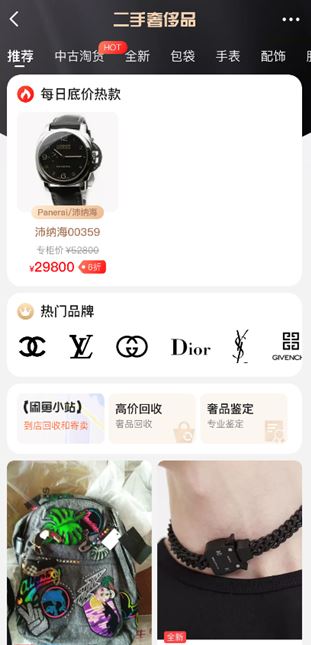
Source: Idle Fish App, second-hand luxury page
One reason why people would like to buy from celebrities is not only to feel closer to their idols, but is it is also trustworthy source of luxury products. Counterfeiting is a big problem for the luxury market expansion in China. But many second-hand luxury e-commerce platforms in China have provided users with authentication services and a guarantee of every stage of the online process.
Listen to over 100 China entrepreneur stories on China Paradigms, the China business podcast
Listen to China Paradigm on Apple Podcast
